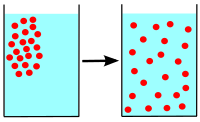
Photo from wikipedia
Thermodiffusion or thermophoresis or Soret effect, i.e., mass-transport induced by thermal gradient, has immense application in segregation of species in two or multicomponent gaseous, liquid, or colloidal mixtures. Here, we… Click to show full abstract
Thermodiffusion or thermophoresis or Soret effect, i.e., mass-transport induced by thermal gradient, has immense application in segregation of species in two or multicomponent gaseous, liquid, or colloidal mixtures. Here, we show that an external thermal gradient can be effectively utilized in creation and modification of patterns in spatially extended systems. We consider Brusselator and chlorine-dioxide iodine malonic acid (CDIMA) reaction-diffusion systems, which follow activator-inhibitor kinetics subjected to an external thermal gradient. We find that the conspicuous interaction of emergent thermodiffusive flux with reaction kinetics and diffusion can lead to various spatiotemporal instabilities in these two models. Specifically, our result reveals formation of Turing-like spatial patterns even for equal diffusivities of the activator and inhibitor components in the Brusselator model under the influence of differential thermodiffusion, whereas formation of such stationary patterns in the CDIMA system from a homogenous stable steady state, which is also stable under differential diffusion, requires the same sign and magnitude of Soret coefficients. However, with equal diffusivities of the components of the CDIMA system and without starch in the medium, our result identifies formation of drifting spiral waves which finally disappears at longer times under the influence of thermodiffusion. We also show formation of propagating patterns of spotlike or stripelike heterogeneity in both the model systems under appropriate conditions. Our study provides a route to pattern formation beyond Turing space and reveals remarkable influence of thermodiffusion to modify the pattern types just by employing an external thermal gradient which also opens up the possibility to set up new related experiments.
Journal Title: Physical Review E
Year Published: 2019
Link to full text (if available)
Share on Social Media: Sign Up to like & get
recommendations!